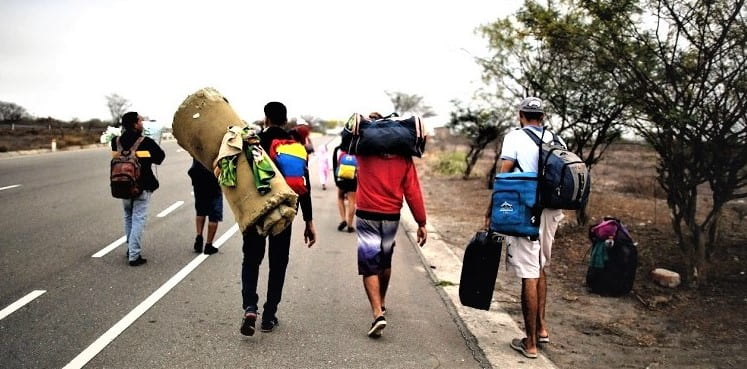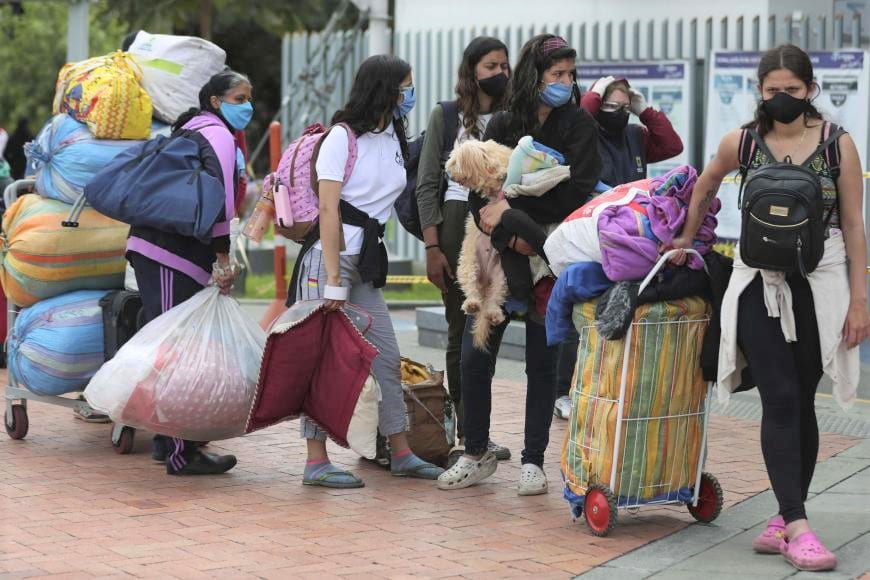By Alexandra Castro
In most countries around the world, the vulnerability of migrants has increased during the COVID-19 pandemic. The reasons for this are several: loss of jobs the difficulty of maintaining quarantine measures due to their participation in the informal labour market, limited access to healthcare and increasing discrimination. These migrants’ family members, who remain in their country of origin, have also been badly affected since they no longer receive remittances. This is the case for thousands of Venezuelans living in Colombia, Ecuador and Peru.

It is estimated that around five million Venezuelans have fled their home country in the past three years, due to the lack of opportunities there, the scarcity of medical supplies, the violence and the dire economic and political situation. They have arrived in neighbouring countries where, in some cases, they have been granted special permits giving them legal status to remain, and in many others they have stayed undocumented. According to the Colombian Population Census Authority (DANE) around 90% of the Venezuelan migrants living in Colombia work in the informal sector, selling goods on the streets or working in delivery.
Given the present pandemic and consequent lockdown ordered by the Colombian government, these Venezuelans have been prevented from earning a living. Consequently, they cannot afford day-to-day expenses such as housing and food and cannot send remittances home to their relatives. According to recent surveys, only 10% of Venezuelan migrants have kept their jobs during the current crisis while 95% are in need of food and 53% in need money to pay the rent. Many migrants have even been evicted from their rented rooms, despite specific rulings forbidding landlords from doing so.
As a result, many migrants, driven by despair, are now trying return home. Local authorities claim that around 2% of those living in Colombia at the beginning of the year have now gone back (more than 60,000 people). The journey home is dangerous not only due to the spread of the virus but several other factors too. These include:
1. The Colombian government has adopted multiple measures to decrease the risk of infection. Migrants wanting to return home have to ask for permission from their municipal authority and arrange their journey according to the dates and conditions it sets. However, some migrants cannot afford to wait for this authorisation so set off without it, risking criminal and administrative sanctions such as deportation and a ban on ever returning to Colombia.
2. The conditions of the journey are very challenging. Some migrants cross the country by foot exposing themselves to multiple risks including theft, sexual assault and even death. Others take buses, sometimes investing their few remaining savings in the tickets. Some local authorities claim to have no funds for financing this transportation while the national authorities have washed their hands of the matter.
3. When arriving at the border, the Venezuelan National Guard only allows a limited number of migrants across the border every three days (recent measures adopted by the Venezuelan government only allow 300 people to cross at one time at the main checkpoint and 100 at the second). This leads to bottlenecks at these entry points and migrants congregating at the border and in neighbouring cities. Some end up sleeping on the streets where they risk becoming infected with or spreading the virus. In the small border town of Villas del Rosario more than 1,000 people are reported to be waiting to cross into Venezuela. The situation has become so drastic that the Colombian authorities believe it could take Venezuelans up to six months to finally re-enter their country: there are currently around 24,000 Venezuelans waiting for the authorisation to cross.

4. Once in Venezuela, returnees are confined to quarantine in overcrowded and inadequate facilities called ‘temporary accommodation centres’. These are usually former schools without the capacity or necessary sanitary facilities to host so many people, having no water or electricity, and no medical aid. Such conditions have been denounced by local NGO’s. Returnees have to remain in these conditions for 14 days under the surveillance of the military and without face masks. When the first quarantine expires, they can travel to their home state but once there face another 14-days of quarantine.
5. On top of these challenges, migrants are being treated as traitors in Venezuela and stigmatised as responsible for the spread of the virus. They cannot work during the quarantine, which means many are left destitute having spent all their remaining money on the journey home. President Maduro has publicly called returnees ‘biological weapons’ and called on people to denounce to the police or even the army and the hospitals those who have entered the country informally and avoided quarantine.
Without the remittances they used to send home these return migrants and their family members will continue facing severe difficulties in Venezuela: the conditions that made them leave in the first place have not gone away. As a result, they are very likely to migrate again: most will go back to Colombia, others may try their luck in other countries. With this in mind, their current return home is, for many, a worthless endeavour driven only by despair, further increasing the vulnerability of an already very fragile migrant population.

